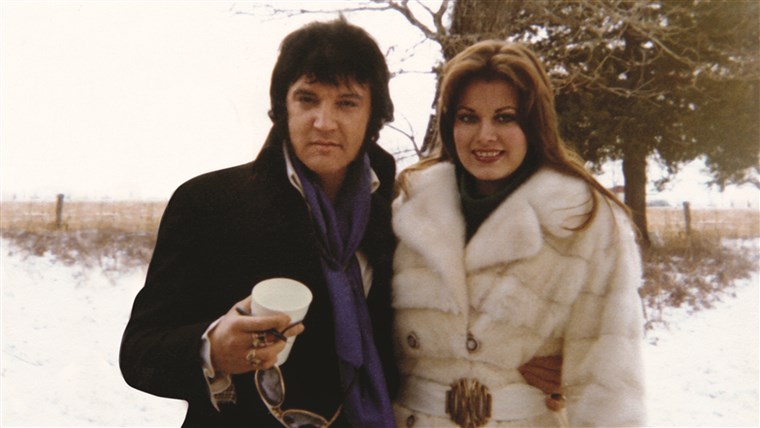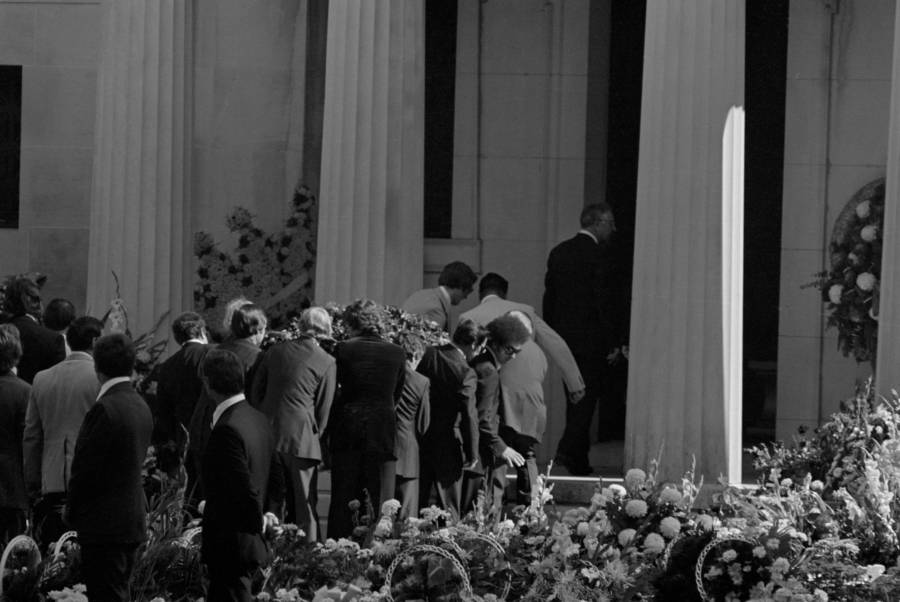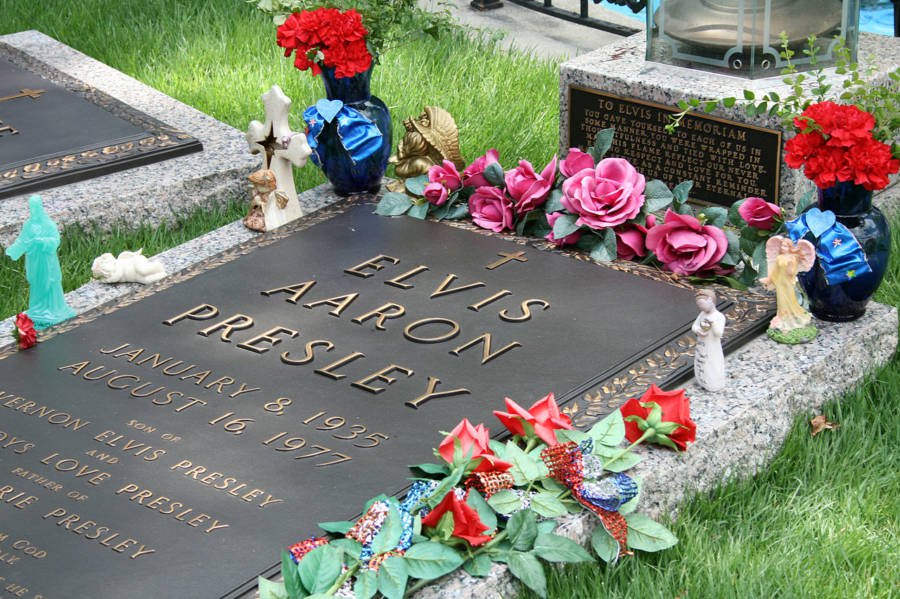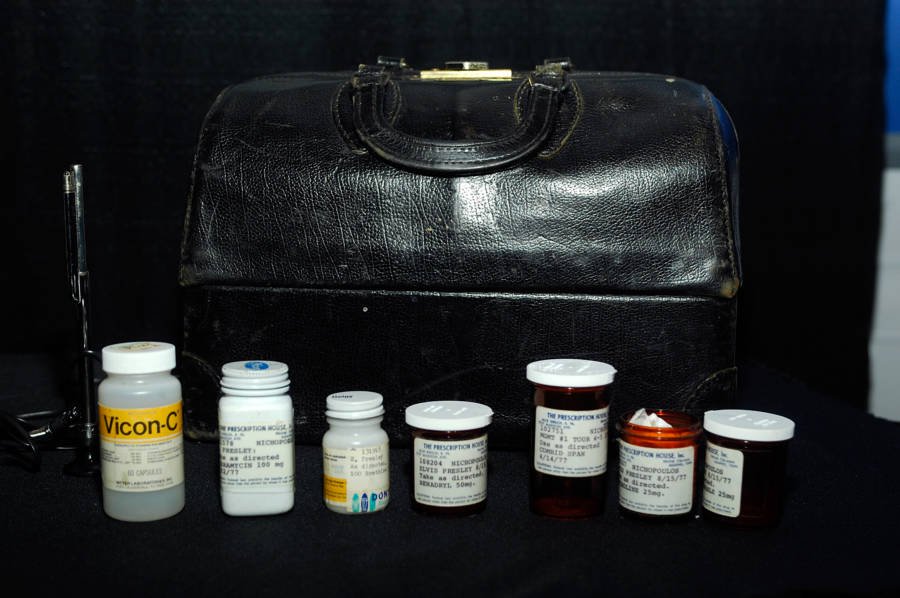
At around 2:30 p.m. on August 16, 1977, actress Ginger Alden walked around Graceland looking for her famous fiance, Elvis Presley. The King of Rock & Roll is about to depart for his latest tour, but Alden can’t see him anywhere and is getting more and more worried.
Alden didn’t notice any trace of Presley until she noticed the bathroom door was cracked. Looking through the crack, Alden was dumbfounded when he saw the scene inside. In his memoir, Alden recounted: “It looked as if Elvis’ entire body had frozen in a sitting position while reaching for the drawer and then fell back.” front”. Alden rushed forward and discovered that Elvis was still breathing, although “his face had turned purple”, “his eyes were rolled back and streaked with red blood”.
An ambulance immediately took the unconscious superstar to Baptist Memorial Hospital in Memphis, Tennessee. Doctors tried to revive the victim but failed. Elvis Presley was announced dead at 3:30 pm, when he was only 42 years old.

But a big, controversial question has loomed over his death ever since: What really caused Elvis Presley to die?
News of Elvis Presley’s death spread worldwide. Then-US President Jimmy Carter declared that the singer “has forever changed the face of American popular culture”, while nearly 100,000 fans were present at his funeral. But chaos happened as soon as the cause of their idol’s death was announced.
The afternoon after Elvis passed away, three doctors performed an autopsy, including Eric Muirhead, Jerry Francisco and Noel Florredo. While the examination took 2 hours to complete, Dr. Francisco himself made an announcement to the press. He stated that preliminary autopsy results showed that the singer died of “arrhythmia” (due to a heart attack) and there was no evidence that his death was drug-related.
In fact, that is not the full answer to the death of the King of Rock & Roll. The autopsy results had not yet been made when Dr. Francisco made his announcement, and neither of the two remaining doctors agreed with his announcement.

Although Francisco’s actions were suspicious, there is also reason to believe that drugs were not involved and that declining health may have taken Presley down. At that time, Elvis Presley was overweight. He loves grilled banana and peanut butter sandwiches and many other unhealthy foods. Presley was diagnosed with many diseases such as diabetes, high blood pressure and glaucoma. An unhealthy diet contributed to Presley’s poor health, but there was another reason.
Just weeks before Presley’s death, three of his former bodyguards published the book “Elvis, What happened?” (Elvis, what happened?”), in which they revealed the star was addicted to the synthetic drug amphetamine.

When the toxicology report was finally released it appeared doctors had tried to cover up the star’s death. Results showed that at the time Presley died, his blood contained high levels of Dilaudid, Percodan, Demerol, codeine and 10 other disturbing drugs. Dr. Francisco then held his own press conference and attempted to deflect questions surrounding the drugs, at the request of Presley’s family members, who were determined to keep his drug use a secret. drug.
Presley first became addicted to amphetamines in his twenties. These substances were legal in the US until 1965. Due to insomnia, Presley was also soon taking antidepressants to help him sleep at night. By the late 1960s, Presley was completely dependent on drugs to stay awake before live performances and to fall asleep at night. This situation is even more serious due to the help of an uncaring doctor.
Video of Elvis Presley singing “Are you lonesome tonight” on June 21, 1977, one of his last performances:
In 1967, Presley first met Dr. George C. Nichopoulos, also known as Dr. Nick, when he treated him for ulcers. Nichopoulos soon became Presley’s personal physician, staying with him in Las Vegas and supplying Presley with addictive stimulants and barbiturates.
Nichopoulos later explained that Presley’s problem was that he didn’t see anything wrong. The star feels that by receiving drugs from a doctor, he is not like the everyday addicts often seen on the streets. Just like that, from 1975 to 1977, Dr. Nichopoulos wrote prescriptions for 19,000 doses of medicine for Presley. In particular, from January to August 1977, he prescribed more than 10,000 doses.

Three years after Presley’s death, Nichopoulos had his medical license suspended. In 1981, he was put on trial for overprescribing drugs to patients. The doctor testified that he was only trying to control the patient’s intake, as well as trying to prevent Presley from obtaining drugs from the streets and was acquitted.
In 1995, Nichopoulos’s medical license was finally permanently revoked, although a year earlier, an investigator who reviewed Presley’s death still concluded that the cause was a heart attack.
Regarding Dr. Nick’s aiding role, a hypothesis is that the long-term abuse of barbiturate nerve blockers has caused users to suffer from severe constipation. Due to the fact that Presley was found unconscious in the toilet, it is possible that when he defecated, he put too much pressure on his already weak heart. The stress combined with obesity, other illnesses and drug abuse may have caused Presley to have a fatal heart attack while going to the bathroom.
Many other theories have also been put forward, but whether it was due to drugs, diet or even constipation, the tragic end of the King of Rock & Roll Elvis Presley left an endless sadness for his fans. at that time.
